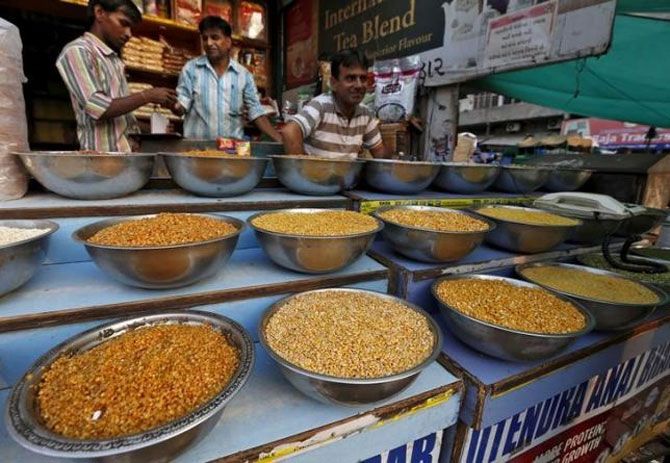 However, prices have begun softening in most places and are Rs 10-15 a kg less than the peak of Rs 200 a kg
However, prices have begun softening in most places and are Rs 10-15 a kg less than the peak of Rs 200 a kg
The price of pulses rose 42 per cent in October as compared to the same period last year, and 10 per cent higher than in September due to low production and hoarding ahead of the festival season.
However, prices have begun softening in most places and are Rs 10-15 a kg less than the peak of Rs 200 a kg.
The sharp rise has pushed the overall Consumer Price Index inflation for October to five per cent.
The Reserve Bank of India's target is that retail inflation must not exceed six per cent by January. It is to review its monetary policy next month.
The prices, mainly of arhar (tur or split pigeon pea) zoomed in retail markets from late September.
Overall, production in 2014-15 (July-June) is expected to be nearly 1.8 million tonnes less than last year. This hit supply and triggered a round of hoarding.
The Centre’s handling of the situation and delay in finalising import also pushed the price.
A global shortage meant the tenders got inadequate response or were too highly priced, necessitating re-bidding.
Officials said India consumes around 60,000 tonnes of pulses a month.
The Centre feels traders had hoarded at least 200,000 tonnes.
It believes importers which had imported large consignments were also not offloading these in the market, to make better profit at a later stage.
The government first extended the stock holding limits by a year, starting September.
It later expanded these to include all importers and exporters, and big food processors.
It then put pressure on states to act against hoarders and there was a nationwide crackdown.
Till date, by official figures, 130,000 tonnes were found stored beyond the permissible limit, in about 12,000 raids across the country.
States have been asked to dispose these stocks in the market.
About 4,600 tonnes of the seized pulses have been sold.
States have also begun retailing of pulses through their own agencies at Rs 130-140 a kg.
For the longer run, the Centre has decided to create a buffer stock of 350,000 tonnes, through purchase from farmers or imports.
The plan is to later expand this to around 500,000 tonnes.
The central government has also raised its minimum support price for gram (chana) and masoor by almost Rs 250 a quintal, while keeping it moderate for wheat, to encourage farmers to shift towards pulses.
The image is used for representational purpose only. Photograph: Reuters









